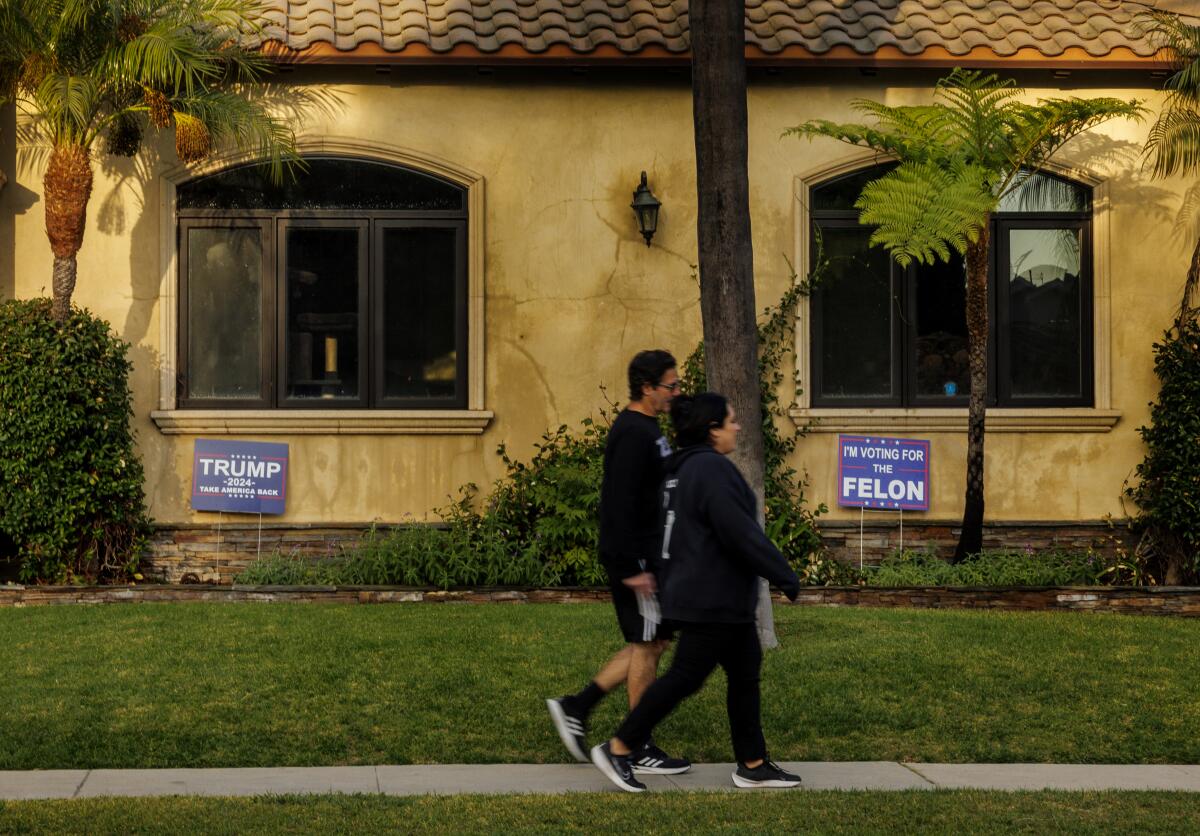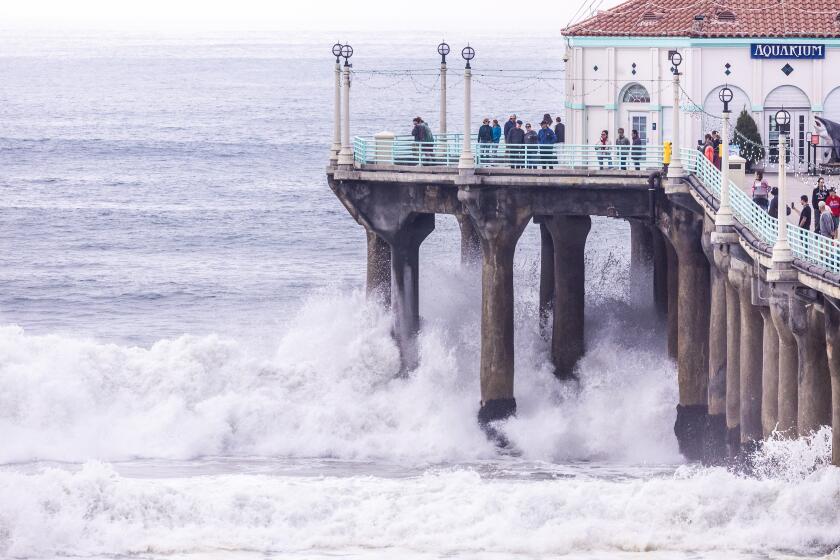It’s hard to admit you voted for Trump in ‘the Mexican Beverly Hills’

A surge of migrants at the border. President Biden’s debate performance. High interest rates. Phillip can tick off the reasons he voted for President-elect Donald Trump.
But that doesn’t mean the first-generation Mexican American is a full-throated Republican. And he sure doesn’t want his neighbors knowing how he voted.
“Downey is a small community,” he said while walking with his wife and two dogs at dusk along a quiet street of lush lawns and wide, flat streets. Supporting Trump antagonizes people around here.
Downey, a suburb about 10 miles southeast of downtown Los Angeles, has become a landing spot for upwardly mobile and wealthy Latinos, so much so it has been dubbed “the Mexican Beverly Hills.” And like many other parts of the middle- and working-class southeast county, the so-called Gateway Cities, it has seen a shift in support toward Donald Trump.
Trump didn’t win any precinct in Downey outright, but he narrowed the gap between himself and his Democratic rivals, and in doing so, made for some awkward moments at family gatherings for people such as Phillip and his wife.
Trump's L.A. gains
While Kamala Harris easily carried L.A. County, Donald Trump made significant inroads in a diverse range of communities. The Times went to three places to understand the shift.
In Downey, Trump gained 18.8 percentage points in November compared with the 2020 presidential election, which saw a record turnout. Other cities in the southeast county moved even further right, though Democrat Kamala Harris still maintained a solid lead. The Trump bump between the two elections was 28.6 points in Bell, 27.3 points in Bell Gardens and 24.1 points in Huntington Park.
“These numbers should be a wake-up call for Democrats,” said Sara Sadhwani, an assistant professor of politics at Pomona College. “They won these cities, but clearly their margin is declining. It presents a host of questions for the future of the Democratic Party and the extent to which they’re going to do outreach and listen to the largest growing segment of the American populace.”
The Trump phenomenon has altered the political landscape and the conversation at family dinners in the Gateway Cities, which like the rest of Los Angeles County, are majority Democratic.
“There’s a stigma,” said Phillip, a 38-year-old construction contractor, who asked to not use his last name for that very reason. His wife said there’s some tension in her Democratic family; her father, who gets his news from Univision, voted for Harris. And she’s frustrated by family members struggling to gain citizenship while newly arrived asylum seekers were housed.
A close look at the data from the Los Angeles County registrar-recorder/clerk’s office show that in more than a dozen southeast cities, there was a shift of 20 points or more toward Trump since 2020. In Downey, Biden had won by 35.1%, while Harris won by 16.3%, a difference of 18.8 points.
Phillip said he voted for President Obama and isn’t the only one who has swung from blue to red in his neighborhood.
The city of 114,000 is 75% Latino and many of the more successful residents made it there with a strong entrepreneurial spirit. The median household income of $97,000 is slightly higher than the rest of California, but the educational level is lower, with about a quarter of all residents holding a bachelor’s degree. This is not a city built on old money.
“Downey is what success looks like for Latinos,” said Luis Alvarado, a political consultant and former Republican who specializes in municipal elections in southeast Los Angeles County. “We have always been conservative ideologically, culturally and religiously.”
Many Latinos now either support or overlook Trump’s anti-immigration rhetoric and his promises of mass deportations, he said.
Nationwide, an estimated 54% of male Latino voters cast their ballot for Trump this election, compared with 39% of Latinas, according to the NEP-Edison Exit Poll. Overall, 51% of Latinos voted for Harris compared with 46% for Trump, according to the poll.
“We have shed immigration as an identifier,” Alvarado said. “It doesn’t define us as Latinos and it leaves us the way the rest of America feels with issues of safety, economic advancement and leaving a legacy for our children.”
Downey isn’t inching rightward in a vacuum. Across blue California, voters were frustrated with homelessness, the economy and the rash of smash-and-grab robberies. They resoundingly rejected progressive measures and candidates.
An initiative that would have imposed harsher penalties for drug possession won and another that would have increased the state minimum wage failed. Voters rejected efforts to end forced prison labor and to allow stronger rent control laws.
But the vitriol that Trump elicits has created an environment of self-suppression in cities that still have a large Democratic contingent.
“Many of us resonate with his policies, but hesitate to express our views due to the potential for judgment or retribution,” said Mario Guerra, a police chaplain and Republican campaign strategist who served on the Downey City Council for years. “Nobody wants that stigma attached to them, but there [are] a lot of closeted Trumpers out there.”
Guerra feels liberals have labeled Trump and his followers as bigots: “People are afraid to be seen as all those things that they call him — racist, anti-women, anti-gay rights and anti- immigrant.”
“I am not those things,” he added. “I am a refugee. I have two gay brothers. I am for everyone’s rights.”
For most of Downey’s history, it was a white farm town, then a hub of the aerospace industry. It was never a liberal bastion. Its neighborhoods evoked Midwest Americana but with palm trees. It is the home of the Carpenters, the first Taco Bell and the oldest existing McDonald’s. The space shuttle Challenger was built there and the city is proudly restoring its original mock-up.
Unlike surrounding cities, Downey has its own police and fire departments, along with a hospital, newspaper, mall and thriving business districts. A third of the residents are foreign-born and the city has a strong Cuban community. City officials say Downey residents value their institutions and don’t want to see them threatened by crime or the economy. They value their first-responders, and in November passed a sales tax to boost funding for public safety.
“The No. 1 thing that residents want from elected officials, from government, is protection. Protect their families and protect their property, and we give them that,” said Downey Mayor Mario Trujillo, a gay Democrat who was just reelected.
He’s not surprised by the rightward lean; for years it was well-known that the City Council was largely Republican. That changed in 2020, when progressives were voted in. Then came the recall of a tenants rights advocate, a vote of no-confidence for Dist. Atty. George Gascón and a city policy that prohibited flying the Pride flag on public buildings.
To Trujillo, who considers himself a moderate Democrat, it signaled a change of course.
“The residents, a lot of them are entrepreneurs, well-to-do families and they do tend to lean conservative,” he said.
Near Gallatin Road, not everyone agrees.
“The majority of Latinos don’t accept Trump because he’s racist,” said Rosa Hurtado, who recently moved into the neighborhood.
Phillip said he’s looking to vote for whomever is best for him, his family and his business. Promised tax cuts would help his business and he expects interest rates to fall under Trump, so he can refinance. And though he said immigrants who are in the country illegally are hard workers, he sees Democrats offering them too much.
“I don’t have a problem with immigrants,” he said. “I have problem with them opening the floodgates.”
Down the street from the couple is a small mansion with a sign out front reading: “I’m voting for the felon,” as if anticipating detractors.
“I have a big Mexican family,” said the woman who opened the door and only identified as Armeta. “And they all voted for Trump.”
Councilwoman Claudia Frometa said voters in Downey were sick of “financially supporting those that have crossed our borders during the illegal migration invasion.”
A Mexican immigrant, Frometa is the first California Republican to hold the title of president for the National Assn. of Latino Elected and Appointed Officials, a 50-year-old nonpartisan group founded by Edward R. Roybal, a pioneering Eastside congressman who championed the underprivileged. She thinks liberals have gone too far.
Soft-on-crime policies “pushed by the left and the Los Angeles County district attorney,” the “illegal migration invasion” and inflation have played a role in the Downey vote, she said.
“Hispanics are not a monolith, and contrary to what the left has continued to push, along with mainstream media, Hispanics care about the issues that impact their everyday lives, wallets, families and put at risk their safety and security and that of their small businesses,” she said.











